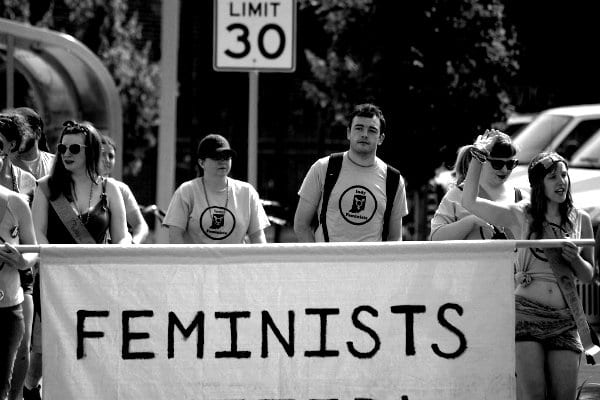Now that I am “out” to the extent possible, I am proud and passionate to be a male feminist. I want to find my place, and play my part but that isn’t straightforward.
'We don't need more loud-mouth men proclaiming to be feminists. We need men taking parental leave' @RobSturrock_CPD https://t.co/FkDS6lqnUy
— Women's Agenda (@WomensAgenda) September 14, 2017
A searing opinion piece, published by the Harvard Crimson, written by Nian Hu made this clear. Her thoughtfulness and passion was obvious from the opening lines and her main message was blunt: beware the male feminist.
Certain passages of hers stayed with me weeks after I read them:
“What these male feminists fail to realize is that, as men, they will always be oppressors. No matter how many feminist marches they attend or how much feminist literature they read, they are not exempt from perpetuating the subordination of women.”
“Feminism does not need men… feminism is a radical and revolutionary movement that will upheave the status quo and remove men as the monopolizers of power. In general, people don’t like to lose power, especially when they’ve had it for so long. Feminism is not supposed to be palatable to men; it is supposed to be threatening.”
I was skewered by Nian’s piece – which is how it should be. Nian is right when she argues that any sincere male feminist should grapple with his role in the patriarchy on a daily basis.
But my heart sank when I ruminated on her argument that men will always represent oppression. No matter how much sheep’s clothing I don, I’m still the wolf.
Male feminism as a concept, good or ill, has a longstanding history of its own in academia and advocacy. I’m only beginning to wrap my head around it and I’m not looking to trample on rich works that have scrutinized this issue from every angle. I’m looking for an accessible entry point to understand where I can go from here as a male feminist.
On one level it’s a perilous time to ask this question. The exposure of Harvey Weinstein’s revolting predatory behavior has rippled across the world. The #MeToo movement has shown the extent of sexual abuse and harassment, largely perpetrated by men. On another level it’s an apt time to take action because men can’t hide from this anymore.
Skepticism and suspicion of the male feminist is entirely justified. Male feminism is often accompanied by sound and fury signifying nothing. Men wear badges, post supportive tweets, attend the odd event, and loudly proclaim their feminist credentials. But action for change tends to be absent. As many writers have pointed out, many male feminists are the worst offenders of sexist behaviour.
I’ve been thinking a lot about what should I be to the feminist cause? Am I merely another monopolizer of power and privilege, a product of the male matrix? Does being a man make me inherently redundant to the cause? Am I a fraud, because it took my wife to truly open my eyes to feminism? Or am I a false prophet because I can never genuinely experience feminism?
My concern is that whilst feminism may not need men, society does. Until Themyscira places its warriors outside Parliament House and declares a new dawn, men aren’t exactly going anywhere. We will remain roughly half the population and a huge portion of the workforce. We’ll still be brothers, sons, fathers, uncles and grandfathers.
Australia’s problem with toxic masculinity and discriminatory bro culture is all about men. Domestic violence is overwhelmingly a gender crime perpetrated by men. And there is a professional Offense and Outrage Industry where men spend their waking hours vandalising feminist advocacy about equality.
Can the end goal be an equitable society, where women and men equally share social and economic power? Where all forms of toxic gender norms are eliminated? Where both women and men have the freedom and power to create their own futures without biases and barriers in their way?
In my mind, that seems to correlate with our fundamental values as a democracy – no one group monopolizing power; no one group subjugated to another. All people with freedom of choice on how to live and who to be.
If this were the objective, undoubtedly it starts with dismantling the patriarchy. But to reach a social equilibrium I can’t help but wonder if men as allies in the cause is more productive than men as the enemy, the nuisance or the irrelevance. If men are the agents of the status quo, can’t we become useful agents of change too?
Feminism should never cater to men but feminism encompassing men – taking them out of the matrix and challenging their preconceived notions – seems valuable. How else, for instance, do we change the bro culture within male social networks?
Instinctively I am drawn to the idea that without advocacy to a wider audience, without men as foot soldiers led by the generals of feminism, the feminist endeavour may not reach its goal.
I would really love feedback on this. I am trying to keep an open mind and no doubt have brought my own biases, assumptions and privilege to this piece. Maybe my best role is to shut up and completely vacate the public forum. Maybe the best role I can play is to focus on ensuring equity in my own family, take my queues from my wife, and softly convince my friends and colleagues to do the same and hope for society-wide change.


